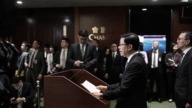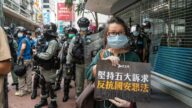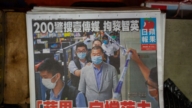【新唐人2012年3月3日訊】香港資深傳媒人程翔新書《千日無悔》近期出版,書中揭開他被中共以「間諜」罪名入獄的部分內幕,以及冤獄期間他身心所承受的巨大創傷。程翔表示,儘管他因「文字獄」坐牢千日,卻沒有改變他的初衷。同時,他也指出大陸司法制度的缺失,他提醒港人捍衛香港的核心價值。
程翔新書題為《千日無悔》,2月29號出版發行。新書長達348頁,詳述了他失去人身自由1020天,在獄中痛苦煎熬的心路歷程。
程翔說,他在獄中,尤其是最初一百天他被單獨囚禁的日子,身心所蒙受的折磨不堪回首。而在「監視居住」的105天中,他曾萌生自殺的念頭。
程翔:「有時,我會等到瘋,你是會想撞牆的。就會大聲叫,有很多時候,你會坐在那無端端的大聲叫:快點來審我啊!你就是對著四邊牆,不知道白天不知道黑夜。來審我的時候,是唯一可以讓我走出房間,去審訊室,也是少少的可以離開房間的活動。」
新書中,程翔明白表示,他「被冤獄」的主要原因是,涉及中共最高層的鬥爭,與他拿了中共前總書記趙紫陽的談話內容無關,也不是泄露了甚麼國家機密。
程翔在他自己的案例中,找到了中共製造冤假錯案的機制。
程翔:「機制就是,明明法律禁止執法當局做的,但它實際上做了,它違背了刑事訴訟法的時候,就一定會導致冤假錯案。中國的問題不在於你無法可依,在於有法不依。」
中共從拘捕程翔那一刻起,已假定他有罪,辦案人員要求他從中共製定的《國家安全法》第4條的五項罪名中自選一項認罪,包括顛覆、竊取國家秘密、間諜等。程翔最終以「間諜罪」被判處五年監禁。
而在大陸,因「文字」觸犯中共神經,遭「顛覆國家政權罪」入獄的例子,屢見不鮮。
2月10號,「浙江民主黨」成員朱虞夫,被當局指控「煽動顛覆國家政權」判刑七年。當局指控他的罪狀包括,去年3月北非和中東國家「茉莉花革命」期間,朱虞夫在互聯網上發表的一首詩:《是時候了》。
另外,去年12月,四川異議人士陳衛,同樣因為在網上發表的幾篇文章,被當局以所謂「煽動顛覆國家政權罪」判處9年徒刑。
香港《開放》雜誌執行編輯蔡詠梅稍早前對《新唐人》表示,中國是一個極權社會,司法完全是黑箱作業。
蔡詠梅:「中國的司法是完全不獨立的,它沒有言論自由的,沒有新聞自由的。所有的權力都在黨的手中。有一個政法委,政法委是誰?屬於黨在管。胡錦濤就可以指使政法委這個案子怎麼怎麼處理?在這種情況下,中國大陸腐敗,完全是一個絕對的那種體制腐敗。」
程翔表示,儘管因為「文字獄」坐牢千日,並沒有改變他的愛國初衷。他指出,香港不能任由中共為「國家機密」下定義,把中共的政治監控輸出香港。同時,他希望港人更好珍惜及捍衛自由、民主及法治價值。
新唐人記者林秀宜、唐睿、孫寧採訪報導。
Ching Cheong’s New Book Unveils the Inside Story of Thousand Days’ Literary Inquisition
Ching Cheong, a senior Hong Kong media veteran, launched
his new book “My 1,000-Day Ordeal: A Spiritual Journey”
recently, in which he unveils part of the inside story of
being charged with espionage and thrown into jail by the Chinese Communist Party(CCP),
and the trauma his body and mind went through in prison.
Ching Cheong said despite the fact that he was put in jail
for a thousand days because of his speech, he didn’t alter his original intention.
At the same time, he pointed out the lack of a Chinese
judicial system, as well as reminded Hong Kong people to defend the core value of Hong Kong.
Ching Cheong’s new book “My 1,000-Day Ordeal:
A Spiritual Journey,” launched on February 29th.
The 348 pages contains the story of his mental turmoil
during the 1,020 days that he lost his personal freedom
while suffering in a Mainland Chinese prison.
Ching Cheong said during the first 100 days, he was placed in
ssolitary confinement, and had an extremely painful mind and body experience.
Then, while another 105 days went by he was placed under
“residential surveillance", where he contemplated suicide.
Ching Cheong: “sometimes, I waited until I was insane.
I wanted to hit the wall. I shouted loudly.
Many times, I sat there and shouted ‘Hurry up, give me a trial!’
I faced four walls, and had no idea what time of day it was.
Attending trial and going to the interrogation room was the
only chance for me to go out of the room.
It was a kind of activity that allowed me to leave the room
for a little while.”
In the new book, Ching Cheong said clearly that the main
reason why he was arrested was due to the struggling within the CCP’s highest leadership.
Zhao Ziyang’s conversation is unrelated to his content, nor did
he leak state secrets.
With his case, Ching Cheong found the mechanism
that CCP uses to sentence the innocent.
Ching Cheong: “It’s clear that the law prohibits the actions
that the authority took. But the authority did it anyway.
When the authority violates the code of Criminal Procedure,
it makes sentences the innocent.
The issue of China is not that there’s no law, but that the
authority doesn’t obey the law. That is the mechanism the CCP employs.”
When the CCP arrested Ching Cheong, they assumed he was
guilty.
The official who handled his case asked him to choose
one of the five charges which included
subversion of state power, theft of state secrets, and espionage.
Ching Cheong was sentenced for 5 years in jail as a “spy.”
In mainland China, a common charge is “subversion of state
power” and many people are jailed because their words against CCP.
On February 10th, Zhu Yufu, a member of Zhejiang Democratic
Party, was sentenced to 7 years in jail with the charge of “subversion of state power.”
The caused his guilty charge by the authority was a poem
entitled, “It’s the Time” that Zhu Yufu posted on line last
March during the “Jasmine Revolution” in the Middle East
and North Africa.
Last December, Chen Wei, a Sichuan dissident was sentenced
to 9 years in jail with the charge of “subversion of state power” because he published several articles online.
Tsai Yung-mei, the executive editor of Hong Kong Open
Magazine, told NTD that China is in a totalitarian society now, and the judiciary is operated under human control.
Tsai Yung-mei: “The Chinese judiciary is completely
independent.
it doesn’t allow people to have freedom of speech, and
there’s no press freedom. All the power is in CCP’s hands.
There’s a Political and Law Commission, but what is it?
It’s the party.
Hu Jintao can order the Political and Law Commission to judge
the case with his opinion.
In this kind of situation, there’s an absolute, complete
corruption in mainland China.”
Ching Cheong said that although he had a thousand days’
literary inquisition, he didn’t change his initial purpose.
He pointed out that Hong Kong can’t allow CCP to define
what is a “state secret,” and can’t allow CCP to employ political control in Hong Kong.
He hopes Hong Kong people cherish and protect their
freedom, democracy, and value the fact that they can use the law to rule.
NTD reporters Lin Xiuyi, Tang Rui and Sun Ning




























